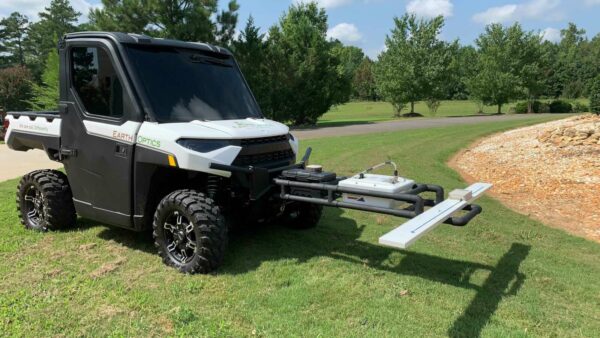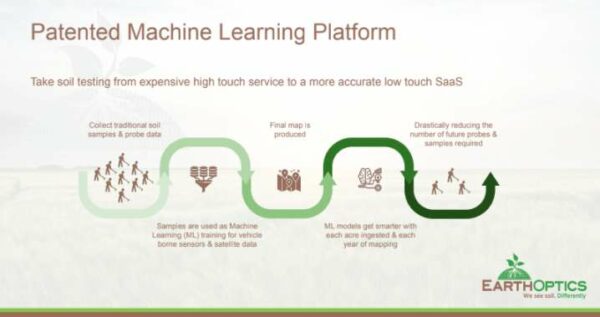Sponsored by Monday Properties and written by ARLnow, Startup Monday is a weekly column that profiles Arlington-based startups, founders, and other local technology news. Monday Properties is proudly featuring 1515 Wilson Blvd in Rosslyn.
A local agricultural technology company is offering tools to help industrial farmers grow food more sustainably and fight climate change.
EarthOptics, a startup with a significant Crystal City presence at 2461 S. Clark Street, developed a product that impressed investors enough that it led to a $10.3 million Series A funding round.
Its product uses technology to imitate a natural process. Every year, the Earth’s terrestrial surfaces and oceans absorb billions of tons of carbon from the atmosphere. Industrial farmlands, however, release more carbon into the atmosphere than they trap, contributing to climate change.
Over the last 50 years, farming has led to 130 billion tons of carbon evaporating from the soil, EarthOptics CEO Lars Dyrud said. But scientists estimate about or 60-70 billion tons could be returned to soil through simple changes such as tilling fields more effectively. That represents five years’ worth of human carbon emissions, he says.
“It’s a win-win for everybody: It takes carbon out of the atmosphere, makes the soil more fertile and makes the food grown there more nutritious,” he said.
EarthOptics has two tools that use Artificial Intelligence to help farmers sequester more carbon in the soil while improving yields and food quality, while trimming costs.
“We’ve taken 130 billion tons of carbon out of the soil through our agricultural practices,” Dyrud said. “It seems fairly straightforward that we can put it back… We all have to eat anyway — if we can make eating part of the solution that seems like a pretty exciting prospect.”

The first product to launch maps how dense the soil is. Due to heavy rains and machinery, soil gets compacted, making it harder for plants to grow. In response, farmers till the land to loosen it, releasing carbon. The map allows farmers to till only where needed and retain more carbon.
This year, EarthOptics launched a tool that measures how much carbon is sequestered so that farmers can be reimbursed through carbon credits for carbon-storing practices. The credits are paid for by large companies looking to offset their carbon emissions, such as Google.
Dyrud said the product makes participation cost-effective for farmers. Traditionally, farmers have to take dozens of soil samples and send them to a lab for testing. This process tends to eat up most of the money they make.
Instead, EarthOptics combines samples and AI sensors to map out carbon levels across the site using fewer samples.
“We’re the only ones that still combine traditional measurements, which is where accuracy and trust comes from, with machine learning to dramatically lower costs,” he said.

That piqued the interest of investment groups such as Leaps by Bayer, the venture arm of German pharmaceutical company Bayer, as well as other firms, including Alexandria-based Route 66 Ventures. With the backing, Dyrud said EarthOptics will scale up its existing products and launch new technologies that measure nutrient levels, which could lower fertilization and irrigation costs.
One day, consumers may see the fruits of EarthOptics’ labor on grocery store shelves. Through carbon mapping, companies will be able to advertise how much carbon was reabsorbed in the making of products such as milk, beer or beef. EarthOptics is looking for food companies to participate, and Dyrud says consumers may be able to see such labels in a year or so.
“You could buy a six pack of carbon beer responsible for taking 20 pounds of CO2 out of atmosphere — that’s equivalent to driving 25 miles in an SUV,” he said.
EarthOptics is the second ag-tech startup in Crystal City that Dyrud’s been part of. He was the co-founder and CEO of OmniEarth, which developed a water resource management product. After it was acquired in 2017, he joined EarthOptics about 2.5 years ago, first as an advisor, then as CEO.
The startup was founded in an ag-tech accelerator in Raleigh, North Carolina. It still retains a North Carolina presence, but Dyrud says Crystal City will continue to house its tech presence and back office.
“[Arlington is] a great area to attract talent, both back office and tech,” he said. “It’s an affordable, livable and workable place to have a tech company.”


